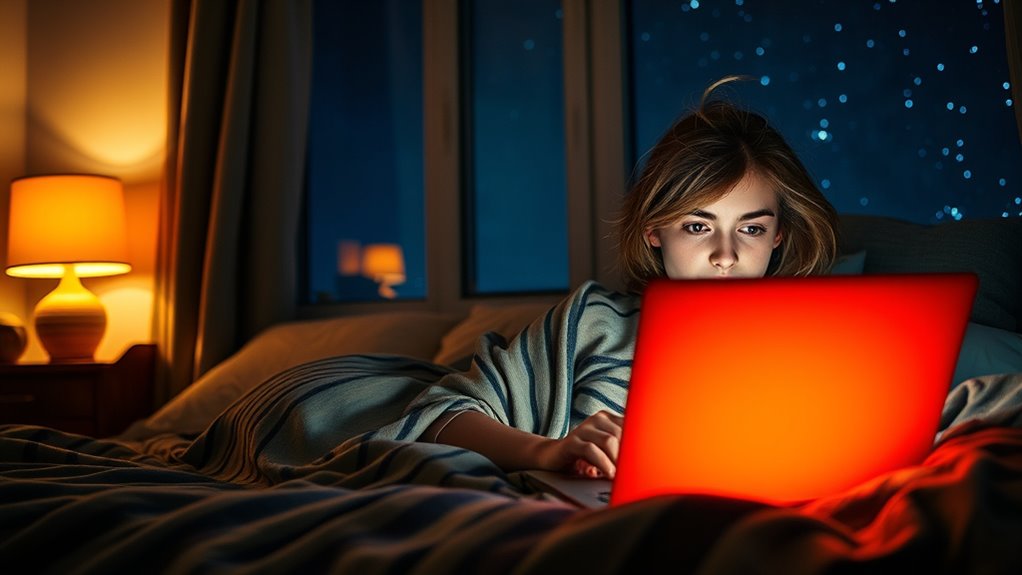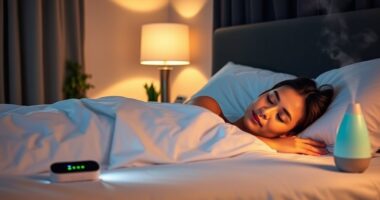Night owls are wired differently because their circadian rhythms lead to delayed melatonin production, making you feel sleepy later at night and wake up later in the morning. This isn’t simply a preference—it’s rooted in your biology and genetics. Your internal clock resists early schedule shifts, which can cause fatigue if forced to follow typical routines. Understanding these biological factors explains why your sleep patterns differ, and exploring more can help you better align with your natural rhythm.
Key Takeaways
- Night owls have a delayed melatonin release, causing them to feel sleepy later and wake up later than early risers.
- Genetic and neurobiological factors influence night owls’ internal clocks, making them biologically predisposed to later sleep times.
- Their circadian rhythm shows less flexibility, resisting schedule shifts and making early mornings challenging.
- Forcing night owls to wake early can disrupt sleep quality, leading to fatigue and decreased alertness.
- Recognizing these biological differences helps tailor routines that align with individual sleep chronotypes for better health.

Your sleep chronotype is the natural pattern that determines whether you’re a morning lark, an evening owl, or somewhere in between. It influences your preferred sleep and wake times, shaping your daily rhythm and energy levels. Night owls, for example, tend to stay alert later into the evening and wake up later in the morning, which can make aligning with typical social or work schedules challenging. This isn’t just a matter of preference; it’s rooted in biology. Your circadian rhythm, the internal clock regulating sleep-wake cycles, plays a central role here. One key factor is melatonin production, which signals your body to feel sleepy as darkness falls. Night owls often have a delayed melatonin release, meaning they don’t feel sleepy until later at night. This delay impacts their ability to fall asleep early and wake up early, reinforcing their natural tendency to be more alert at night.
Understanding circadian flexibility is essential when considering your sleep patterns. Some people have a rigid circadian rhythm, making it difficult to shift sleep times without feeling groggy or unrested. Others possess greater flexibility, allowing them to adapt more easily to different schedules. Night owls generally display less circadian flexibility, meaning their internal clocks resist changing easily. This biological resistance explains why trying to force a night owl to wake up early can lead to poor sleep quality, fatigue, and decreased alertness during the day.
Your body’s production of melatonin, which peaks during the night, is closely tied to your sleep chronotype. If you’re a night owl, your melatonin might be suppressed or delayed, causing you to feel more awake when most others are winding down. Conversely, early risers experience an earlier peak in melatonin, aligning their sleep-wake cycle with the conventional daytime hours. This difference isn’t just about habits; it’s embedded in your genetics and neurobiology.
Recognizing your chronotype can help you optimize your schedule, rather than fighting against it. If you’re a night owl, trying to conform to early-morning routines might leave you feeling perpetually tired or out of sync. Instead, you can structure your day around your natural rhythm, ensuring you get enough sleep and remain productive during your peak alert times. Embracing your biological predispositions doesn’t mean giving up; it means working smarter with your circadian rhythm and melatonin production to improve your overall well-being.
Frequently Asked Questions
Can Night Owls Improve Their Sleep Timing Naturally?
Yes, you can improve your sleep timing naturally. To do this, limit light exposure in the evening to boost melatonin production, helping you fall asleep earlier. Morning light exposure can also help shift your internal clock earlier. Consistently sticking to a sleep schedule, reducing screen time before bed, and creating a relaxing bedtime routine support your efforts to align your sleep pattern with natural rhythms.
Do Chronotypes Change Over a Lifetime?
Think of your chronotype as a river’s course, which can shift over time. While your genetic predispositions set its general path, lifestyle influences like stress, work schedules, and age can cause it to meander. So, yes, your sleep patterns can change across your lifetime. You might start as a night owl and gradually become more of a morning person, or vice versa, as your body adapts to new habits and life stages.
How Do Sleep Chronotypes Affect Mental Health?
Your sleep chronotype influences your circadian rhythm, which impacts your mental health. Night owls often experience misalignment with typical schedules, leading to sleep deprivation and emotional resilience issues. This disruption can increase stress, anxiety, and depression. By understanding your chronotype, you can better align activities with your natural rhythm, improving mood and emotional stability and supporting overall mental well-being.
Are There Specific Careers Suited for Night Owls?
You might find that careers offering flexibility suit night owls best. Jobs like freelance work, creative fields, or tech roles often allow you to work during your peak hours. Your ability to adapt socially can help with night shifts or unconventional schedules. Embracing career flexibility enables you to optimize productivity, while social adaptation helps you balance work and personal life effectively. This way, you thrive in roles aligned with your natural rhythms.
Can Adjusting Sleep Schedules Reduce Health Risks?
Imagine you’re steering a ship through foggy waters—adjusting your sleep schedule is like clearing the fog. By practicing good sleep hygiene and increasing daylight exposure, you can steer toward better health, reducing risks like fatigue and mood swings. While it’s possible to improve your well-being, consistency is key. Small changes help your body reset its internal clock, making you feel more energized and balanced over time.
Conclusion
As you navigate your nights and mornings, remember your unique sleep chronotype paints a vivid picture of your inner clock. Whether you’re a night owl basking in moonlight or an early bird greeting dawn, your brain’s wiring influences your rhythm. Embrace your natural pattern like a painter chooses their colors—beautifully individual. By honoring your internal timekeeper, you align with your true self, creating a harmonious dance between your sleep and wakefulness that feels just right.










